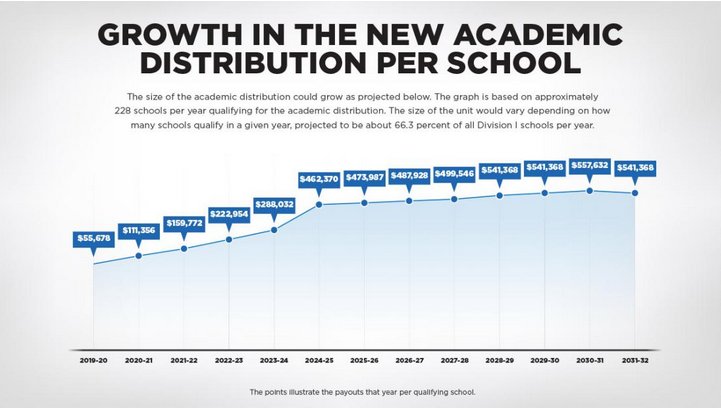You have /5 articles left.
Sign up for a free account or log in.
The National Collegiate Athletic Association announced Thursday that, beginning in 2019, it will distribute millions of dollars in revenue to member institutions based on the academic performance of their athletes. The money will come from the association's new $1.1 billion multimedia rights deal for the NCAA's men's basketball tournament. Colleges will be awarded the funds by earning "academic units" based on the academic performance of their teams, similar to how programs earn units based on how far they advance in the tournament.
According to the NCAA, each school can earn one academic achievement unit per year if its athletes meet at least one of the following requirements:
- Achieve an overall single-year, all-sport academic progress rate of 985 or higher.
- Achieve an overall all-sport graduation success rate of 90 percent or higher.
- Achieve a federal graduation rate that is at least 13 percentage points higher than the federal graduation rate of the student body at that school.
The NCAA estimated that about 66 percent of the 349 Division I institutions will earn an academic unit in the first year of the new system, meaning each of those colleges will receive about $55,678. The size of the distribution will grow each year, the NCAA stated, with the amount of money each college receives swelling to about $500,000 by 2031.
The Knight Commission on Intercollegiate Athletics has called for the creation of such a system for 15 years. William E. Kirwan, the commission's chair, who is retiring in December after a decade of leading the group, said in a statement Thursday that he was glad to finally see the change happen.
“It’s especially gratifying, in my final months on the commission, to see the NCAA take this game-changing step to place a higher value on education in college athletics,” Kirwan said. “It is critical to align the incentives in college sports with educational values.”
But David Ridpath, president of the Drake Group, an organization pushing for more emphasis on academics in college sports, said the change was little more than a public relations move by the NCAA.
"Just like the [academic progress rate], this becomes a measurement that schools that are already rich can reach easily just by continuing a system of academic sleight of hand and eligibility maintenance, along with expensive 'academic support' programs," Ridpath said. "This monetary bonus and the current academic measurements used by the NCAA do not measure true academic progress, and without a system of transparency and disclosure, they never will. The lower-resource schools that need the money will continue to lose out, because they don’t have the resources or ability to chase these numbers. They end up getting punished for essentially not gaming the system. Let’s not forget some of the highest APRs over the past few years were Auburn, Michigan and North Carolina. Need I say more?"









